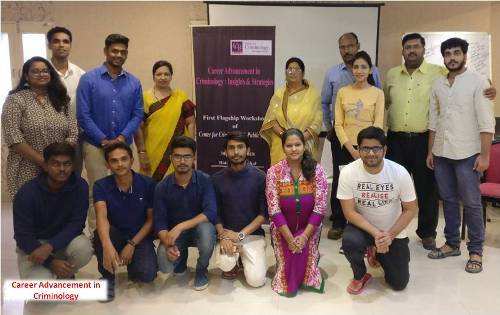CCPP workshop stresses on employability skills under Criminology
National workshop organized by the Center for Criminology & Public Policy (CCPP) in Udaipur recently stressed the need for employability skills to meet the contemporary demands of the labour-market

National workshop organized by the Center for Criminology & Public Policy (CCPP) in Udaipur recently stressed the need for employability skills to meet the contemporary demands of the labour-market.
The two-day workshop was held as a part of Center’s new initiative called ‘Career Enrichment Clinic’. “This initiative is aimed at boosting the employability prospects of criminology graduates by imparting industry-relevant skills training and education. While engaging employers in an interactive process with the students and academics lies at the heart of this program, what led to the start of this initiative is the Center’s commitment to accomplish Abdul Kalam’s 2020 Vision, which focused on transforming India by enabling youths to become job-generators – instead of job-seekers”, said R Rochin Chandra, a policy entrepreneur and director of the Center.

Talking about the relevance of the workshop, Rochin explained that: “unlike institutional settings, this workshop offered a stimulating environment for participants to debate and discuss career-related challenges facing criminology graduates, today. Alongside this, the participants were given some cutting-edge exercises to support their professional development”.
“To make their experience more enriching, the Center invited a delegation of experts from relevant sectors including policy and governance, innovation and enterprise, security and vigilance, investigative journalism, criminal justice social work, financial risk management and, social activism. These experts familiarized the participants with changing needs and demands of the market forces, and helped them refocus on skills, essential to fight job crisis in the field,” Rochin added.
Reflecting on the observations from the workshop, Rochin recalled that: “in this era of fierce competition, qualifications alone will not get you jobs; the students of criminology will have to hone their USP – unique selling proposition. This means creating a niche factor which makes them more desirable and different from graduates of relevant disciplines”.
Rochin further noted that: “professional and research organizations of criminal justice are looking for certain specific skills set. This includes effective writing skills, competence in interpersonal communication, strong background in research methods, flair for data analytics and, critical and analytical thinking abilities”.
“Apart from these qualities, we also advised the participants: to deepen their subject-knowledge, to engage more actively with community, to inculcate the habit of interdisciplinary learning, to develop an impressive network with relevant stakeholders, and to learn to market their knowledge and expertise”, he said.
“Doing so, will dramatically increase the employability rate of criminology graduates”, Rochin pointed out.
Among the guests of honor, Professor Manju Mandot, the Director of Center for Women Studies at Janardhan Rai Nagar Rajasthan Vidhyapeeth, encouraged the participants to take up research as a possible career option, while Ms. Archana Sharma, a senior political leader, explained the linkages between crime control and politics.
Dr. Amit Thakre, who is presently working as an assistant professor at the National Institute of Criminology & Forensic Science, Delhi, facilitated the workshop proceedings along with Director. He was also one of the keynote speakers for the workshop.
An official record of the workshop was prepared by the Assistant Rapporteurs, Alla Syam Kumar and Sandhya Nair, while the draft report was read out by Jay Anand, a Special Rapporteur. Participants hailed from different parts of the country including Delhi, Karnataka, Tamil Nadu, Jharkhand, Uttar Pradesh and Rajasthan.
An executive summary of the workshop will be acknowledged to all heads of criminology departments in India, Rochin said in a press release here.
To join us on Facebook Click Here and Subscribe to UdaipurTimes Broadcast channels on GoogleNews | Telegram | Signal


